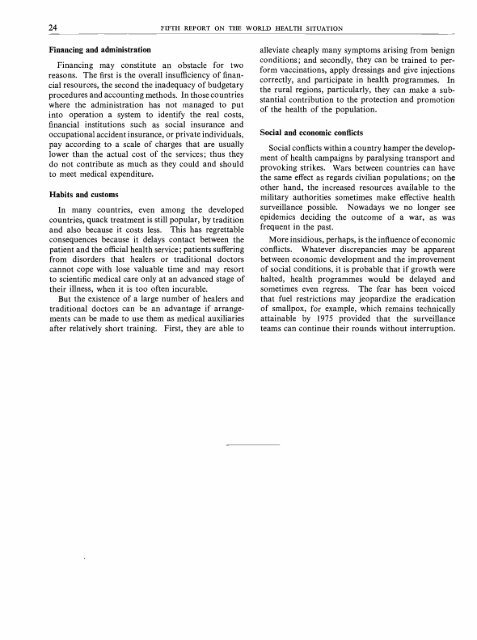FIFTH REPORT - World Health Organization
FIFTH REPORT - World Health Organization
FIFTH REPORT - World Health Organization
You also want an ePaper? Increase the reach of your titles
YUMPU automatically turns print PDFs into web optimized ePapers that Google loves.
24 <strong>FIFTH</strong> <strong>REPORT</strong> ON THE WORLD HEALTH SITUATION<br />
Financing and administration<br />
Financing may constitute an obstacle for two<br />
reasons. The first is the overall insufficiency of financial<br />
resources, the second the inadequacy of budgetary<br />
procedures and accounting methods. In those countries<br />
where the administration has not managed to put<br />
into operation a system to identify the real costs,<br />
financial institutions such as social insurance and<br />
occupational accident insurance, or private individuals,<br />
pay according to a scale of charges that are usually<br />
lower than the actual cost of the services; thus they<br />
do not contribute as much as they could and should<br />
to meet medical expenditure.<br />
Habits and customs<br />
In many countries, even among the developed<br />
countries, quack treatment is still popular, by tradition<br />
and also because it costs less. This has regrettable<br />
consequences because it delays contact between the<br />
patient and the official health service; patients suffering<br />
from disorders that healers or traditional doctors<br />
cannot cope with lose valuable time and may resort<br />
to scientific medical care only at an advanced stage of<br />
their illness, when it is too often incurable.<br />
But the existence of a large number of healers and<br />
traditional doctors can be an advantage if arrangements<br />
can be made to use them as medical auxiliaries<br />
after relatively short training. First, they are able to<br />
alleviate cheaply many symptoms arising from benign<br />
conditions; and secondly, they can be trained to perform<br />
vaccinations, apply dressings and give injections<br />
correctly, and participate in health programmes. In<br />
the rural regions, particularly, they can make a substantial<br />
contribution to the protection and promotion<br />
of the health of the population.<br />
Social and economic conflicts<br />
Social conflicts within a country hamper the development<br />
of health campaigns by paralysing transport and<br />
provoking strikes. Wars between countries can have<br />
the same effect as regards civilian populations; on the<br />
other hand, the increased resources available to the<br />
military authorities sometimes make effective health<br />
surveillance possible. Nowadays we no longer see<br />
epidemics deciding the outcome of a war, as was<br />
frequent in the past.<br />
More insidious, perhaps, is the influence of economic<br />
conflicts. Whatever discrepancies may be apparent<br />
between economic development and the improvement<br />
of social conditions, it is probable that if growth were<br />
halted, health programmes would be delayed and<br />
sometimes even regress. The fear has been voiced<br />
that fuel restrictions may jeopardize the eradication<br />
of smallpox, for example, which remains technically<br />
attainable by 1975 provided that the surveillance<br />
teams can continue their rounds without interruption.
















